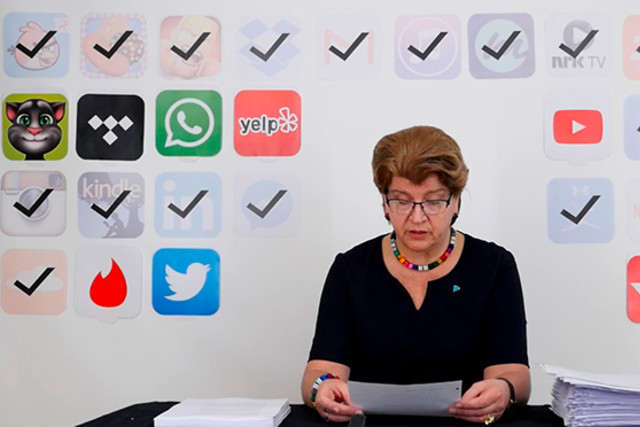
Norway’s Consumer Council believes we don’t bother with them because of their “absurd … scope, length, and complexity,” an issue it decided to highlight this week by reading aloud the user agreements of 33 popular mobile apps during a special event streamed live online.
Why 33? Because on average that’s how many a Norwegian smartphone owner has on their device, apparently.
The chosen apps included Netflix, YouTube, iTunes, Facebook, Skype, Instagram, and Angry Birds. With the combined agreements totaling around a quarter of a million words, the organizers wisely decided not to leave the reading marathon to one person, choosing instead to get lots of people involved. In the end, more than 100 participants each took turns, with the read-a-thon lasting a total of 31 hours and 49 minutes.
Still reading app terms after 25 Hours. LIVE! https://t.co/bTzQkeyrtF #appfail pic.twitter.com/XEMMPWZ3Pk
— Forbrukerrådet (@Forbrukerradet) May 25, 2016
Finn Myrstad, digital policy director at the Norwegian Consumer Council, said the current state of terms and conditions for digital services is now borderline ridiculous, adding, “Their scope, length, and complexity mean it is virtually impossible to make good and informed decisions.”
Speaking to BBC Radio, Myrstad said that in some cases when you accept the terms, you could be waiving “fundamental consumer rights and privacy rights,” adding that sometimes there’s even a clause that says the app maker has the right to change the conditions at any time and without notice to the user, making a mockery of the entire system.
He said the “take it or leave it” model is bad for consumers, and suggested there should be check boxes allowing you to agree or disagree with certain conditions while still getting access to the app.
Asked for an example of a ludicrous condition in a user agreement, Myrstad singled out iTunes. Nestled among its 21,000-word terms-and-conditions document is the promise not to use Apple’s music app to produce a weapon of mass destruction. Really, it’s there:
“You also agree that you will not use these products for any purposes prohibited by United States law, including, without limitation, the development, design, manufacture, or production of nuclear, missile, or chemical or biological weapons.”
While it’s not clear how one might go about using iTunes to create a nuclear bomb, it seems Apple just wants you to confirm that even if you can, you won’t. So don’t get any ideas.
Myrstad and his team are calling on companies to shorten and simplify their user agreements and adopt a common standard in order to “build trust” between companies and consumers. We’re not holding our breath.

